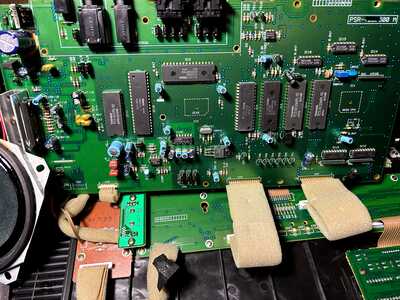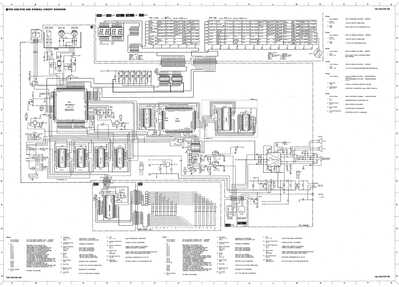I thought I may as well post a quick picture for this. I've had a Yamaha PSR-500 synth keyboard for decades, maybe around 30 years.
It stopped playing any sound a while ago so I opened it up the other day to see if I could track down the problem. I was hoping a capacitor self destructed or an IC died, so I might stand a chance of fixing it. But I haven't pinned it down yet. Even if I do find the problem, I don't think I have enough skill to replace a component without trashing something else! If all else fails, I'll try to cannibalize parts, like power and input jacks, and whatever ICs I can remove without damaging them.
Here's a quick picture of the main board. Sorry for the poor quality picture; the board is tightly connected and there isn't a lot of movement to better frame it for a picture.
Anyway, I thought you might find this interesting to see.
@yurkshirelad I thnk your best approach to troubleshoot is to use a scope and a signal generator. I would start at the speaker end, placing my scope across the speaker terminals (both if stereo and you have a 2 chan scope) then poke the signal generator in at the first observable spot and keep going until it stops. Then it's your knowledge and experience to decide what to do.
If you don;t plan on using it, a decent soldering kit like a lower end Hakko FX-951 with a wedge tip, liquid flux and desoldering braid OR a hot air gun like a ATTEN ST-862D to desolder again using some liquid or paste flux plus desoldering braid.
First computer 1959. Retired from my own computer company 2004.
Hardware - Expert in 1401, and 360, fairly knowledge in PC plus numerous MPU's and MCU's
Major Languages - Machine language, 360 Macro Assembler, Intel Assembler, PL/I and PL1, Pascal, Basic, C plus numerous job control and scripting languages.
Sure you can learn to be a programmer, it will take the same amount of time for me to learn to be a Doctor.
There's no signal at the speakers nor out of the op amp that drives them, as far as I can tell. It's been a while since I did anything with electronics, so I'll re test another day. Just to make sure I'm hitting the right pins on the op amp.
Hi @yurkshirelad & Ron @zander,
A quick Google revealed a PSR-500 Service Manual pdf which could be helpful in your quest. It is a bit 'high level', and doesn't include a schematic, but I note it shows an LA4700, which a further Google reveals to be intended as 2 channel car radio output amplifier.
As the LA4700 is intended for car usage, its 'expected' power is only about 13V, so that both wires to the speaker are actively driven in anti-phase, to produce enough power. This means that connecting the 'earth' clip part of a scope probe to either of the speaker terminals risks shorting that amplifier output to ground, with the possible risk of causing damage.
As it happens, the Sanyo data sheet for the LA4700 claims the outputs are protected against shorts to ground, so in this particular case, it may survive being maltreated in this way. In addition, whether connecting the scope earth clip actually causes a short depends upon the power supply and ground wiring to both the scope and the PSR-500.
--------------
So, whilst connecting a scope probe earth clip to a loudspeaker output pin will not always cause a problem, I would never do it without being completely sure that the chosen pin was connected to the ground/zero voltage line.
For an amplifier like this one, I would connect the scope ground clip to the amplifier ground/0V line, and check each of the speaker terminals with the scope probe. To be completely sure, with a 2-channel scope, connect both probes to the same amplifier output channel, so that each probe is checking one speaker terminal, and look for the pair of inverted waveforms when a signal is present. (Then repeat for the other channel.)
--------------------
Personally, probably before using a scope, I would start by checking the LA4700 is working and able to drive the speakers. I would expect a small audio frequency signal injected into the left channel (pin 8) and right channel (pin 11) to produce a corresponding tone in the appropriate speaker.
Generally, with audio amplifiers, a moist finger injects enough mains 'hum' noise to show the amplifier channel is alive and kicking. Of course, this approach assumes the amplifier is low voltage, which is true in this case ... BUT don't do it if the amplifier has high voltages present - e.g. valve/tube amplifiers (in particular) can have a lethal bite if you accidentally pick the wrong pin!!! So please stay safe at all times.
Best of luck, Dave
@davee Never heard of 'anti-phase'. Sorry but I just assume everyone knows that the ground clip goes on a ground point.
First computer 1959. Retired from my own computer company 2004.
Hardware - Expert in 1401, and 360, fairly knowledge in PC plus numerous MPU's and MCU's
Major Languages - Machine language, 360 Macro Assembler, Intel Assembler, PL/I and PL1, Pascal, Basic, C plus numerous job control and scripting languages.
Sure you can learn to be a programmer, it will take the same amount of time for me to learn to be a Doctor.
Hi Ron @zander,
Sorry if I misunderstood your comment, but you said ", placing my scope across the speaker terminals ", which I interpreted literally.
With the class AB and B outputs, which were common in the late 1960s and early 1960s, when one speaker terminal was often connected to ground, this would have been the same thing.
So far as I remember, the term anti-phase is common with respect to linear amplifiers and op-amps, when both the incoming (non-inverted) and the anti-phase (inverted) signal passes through the amplifier. Perhaps referring to anti-phase is more common on my side of the Atlantic?
Best wishes, Dave
@davee I was pretty sure what you meant by anti-phase, but it is not a term I ever heard before. And yes, my recollection is the chassis was common/ground and one side of speaker is connected but what is more to the point, I am accustomed to speaking with people who are involved in the same thing I am and we share a common 'short-hand'. I need to try harder to speak at the beginner or lower level more often but I will likely fail but then you get to correct me thus maintaining the imperialist colonialist paradigm. 😀
First computer 1959. Retired from my own computer company 2004.
Hardware - Expert in 1401, and 360, fairly knowledge in PC plus numerous MPU's and MCU's
Major Languages - Machine language, 360 Macro Assembler, Intel Assembler, PL/I and PL1, Pascal, Basic, C plus numerous job control and scripting languages.
Sure you can learn to be a programmer, it will take the same amount of time for me to learn to be a Doctor.
Hi Ron @zander,
We all use shorthand descriptions, especially when we know the other person(s) we are talking to. When I don't know the other person's experience, then I confess to tending to over explain, on the basis that being a bit over the top is probably safer than leaving someone to have an accident or create a new problem.
As to colonialist - imperialist paradigms, with the dubious exceptions of some small islands, I don't really feel that has applied to the UK in my lifetime, and certainly never figured in my thinking. I just try to help people to the best of my ability.
Best wishes, Dave
@davee No problems. This is a good example of the problem with email or text or whatever this is. I was just pulling your leg re imperialist etc.
First computer 1959. Retired from my own computer company 2004.
Hardware - Expert in 1401, and 360, fairly knowledge in PC plus numerous MPU's and MCU's
Major Languages - Machine language, 360 Macro Assembler, Intel Assembler, PL/I and PL1, Pascal, Basic, C plus numerous job control and scripting languages.
Sure you can learn to be a programmer, it will take the same amount of time for me to learn to be a Doctor.
Hi Ron @zander,
Fine ... I was wondering why my left foot seemed further away from my head than the right foot .... take care, my friend, Dave
@davee Oh no, that is the Greenwich effect.
The difference in leg length is inversely proportional to the square of the distance you are from the prime meridian, but only for leap years that are also Fibonacci numbers when the month has an R in it.
Of course, if you are well grounded or earthed, as you might say, then it is irrelevant.
Take care my almost royal friend,
Ron
First computer 1959. Retired from my own computer company 2004.
Hardware - Expert in 1401, and 360, fairly knowledge in PC plus numerous MPU's and MCU's
Major Languages - Machine language, 360 Macro Assembler, Intel Assembler, PL/I and PL1, Pascal, Basic, C plus numerous job control and scripting languages.
Sure you can learn to be a programmer, it will take the same amount of time for me to learn to be a Doctor.
@davee OMG, I just thought of another reason you might be experiencing that. One side of your head may be more inflated than the other! Generally, an ice pack held to the more inflated side will equalize that. But be very careful you do not overdo it because then you will have to reduce the swelling in the other half, and if that continues, you can end up with dreaded pinhead syndrome. Good luck and take care my friend,
Ron
First computer 1959. Retired from my own computer company 2004.
Hardware - Expert in 1401, and 360, fairly knowledge in PC plus numerous MPU's and MCU's
Major Languages - Machine language, 360 Macro Assembler, Intel Assembler, PL/I and PL1, Pascal, Basic, C plus numerous job control and scripting languages.
Sure you can learn to be a programmer, it will take the same amount of time for me to learn to be a Doctor.
Turns out the power adaptor I was using was broken. I measured 26V across the GND/Vcc pins of the output op amp! So I tried a different power adaptor and the keyboard plays sound again.
There's some hum from the left speaker, which is probably mains interference. I did see a small 60Hz signal on the output of the op amp, but that was when using the old power adaptor. I haven't tried it with the replacement. Something may have been damaged, or perhaps I did something by accident while opening the keyboard, doing my investigation or when putting it back together.
Here's the schematic from Yamaha's service manual, fascinating!
@yurkshirelad So glad you saved the keyboard. As to the hum, I am sure our mutual friend Dave (@davee) might have some ideas. I suspect you are right regarding mains, but as Dave likes to remind me my 'earthing' instincts are shall we say leaving something to be desired.
Seriously though, my first step would be to connect a wire from a genuine earth like a water pipe or your electrical system ground/earth to the chassis of the synth. After that, not sure but Dave will know.
First computer 1959. Retired from my own computer company 2004.
Hardware - Expert in 1401, and 360, fairly knowledge in PC plus numerous MPU's and MCU's
Major Languages - Machine language, 360 Macro Assembler, Intel Assembler, PL/I and PL1, Pascal, Basic, C plus numerous job control and scripting languages.
Sure you can learn to be a programmer, it will take the same amount of time for me to learn to be a Doctor.


